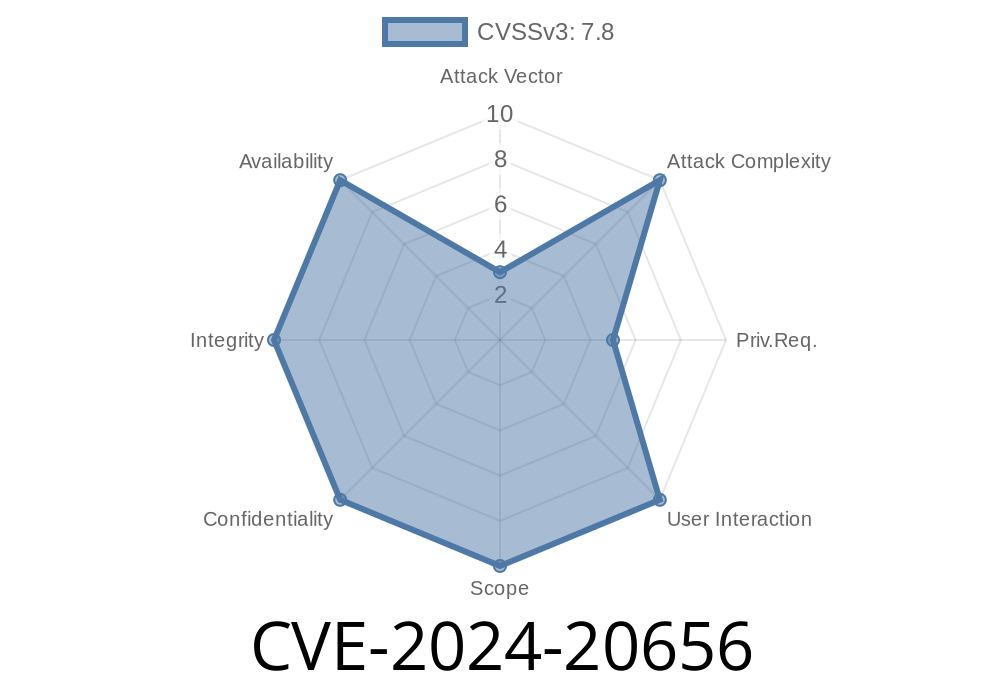---
Introduction
In January 2024, Microsoft disclosed a critical vulnerability in Visual Studio, marked as CVE-2024-20656. This flaw, classified as "Elevation of Privilege," could let attackers gain higher system privileges through improper checks inside Visual Studio. In this post, I'll break down what this vulnerability is, why it should matter to you, how an attack might look in practice (with code snippets), and where you can learn more.
What is CVE-2024-20656?
CVE-2024-20656 is an elevation of privilege issue found in Visual Studio, Microsoft's widely used development environment. In short: it lets someone with access to a low-privileged Visual Studio project escalate their privileges on the system, opening the door for all sorts of nasty exploits.
Affected Versions:
Severity: High (CVSS Score: 7.8)
Microsoft Advisory:
- Microsoft Security Response Center: CVE-2024-20656
Why Does This Matter?
With Visual Studio installed on countless business and personal computers worldwide, any privilege escalation flaw is a big deal. If an attacker tricks you into opening a maliciously crafted project, they could potentially:
Create new admin accounts
That means developers—and by extension, any systems that trust their code—are at risk.
The Core Issue
The vulnerability revolves around how certain project files or extensions are handled in Visual Studio. If a project file references a script or executable, Visual Studio sometimes fails to check permissions properly. This allows execution as a higher-privileged user.
Realistic Exploit Scenario
Let’s build a simplified example:
Suppose an attacker crafts a .csproj project file that abuses a custom build event.
MaliciousProject.csproj
<Project Sdk="Microsoft.NET.Sdk">
<PropertyGroup>
<OutputType>Exe</OutputType>
<TargetFramework>net6.</TargetFramework>
</PropertyGroup>
<Target Name="AfterBuild">
<Exec Command="powershell.exe -Command "Start-Process notepad.exe -Verb runAs"" />
</Target>
</Project>
The AfterBuild target runs after the project is built.
- The command launches PowerShell, which starts Notepad with runAs—requesting elevated permissions.
If a developer builds this project and Visual Studio is affected, it can allow the code to run as administrator without proper user consent!
Note: Actual exploitation may require trickier payloads or leveraging further logic flaws, but this illustrates the underlying risk.
What’s the Fix?
Microsoft released patches for all supported Visual Studio versions.
ACTION:
- Update Visual Studio via the official installer/updater.
Never open untrusted projects or extensions.
Reference:
- Microsoft Security Guidance - CVE-2024-20656
Review Project Files:
Be cautious when opening projects from unknown sources. Examine .csproj and .vbproj files for suspicious build events or scripts.
Microsoft Advisory:
CVE-2024-20656 - Visual Studio Elevation of Privilege Vulnerability
- NIST NVD Entry
- Visual Studio Release Notes
Conclusion
CVE-2024-20656 serves as another reminder that complex development tools can introduce serious risk if left unpatched. Keep your IDEs updated, review code and project files—especially when working with third-party or open-source projects—and stay alert to security advisories.
Timeline
Published on: 01/09/2024 18:15:48 UTC
Last modified on: 04/11/2024 20:15:11 UTC
